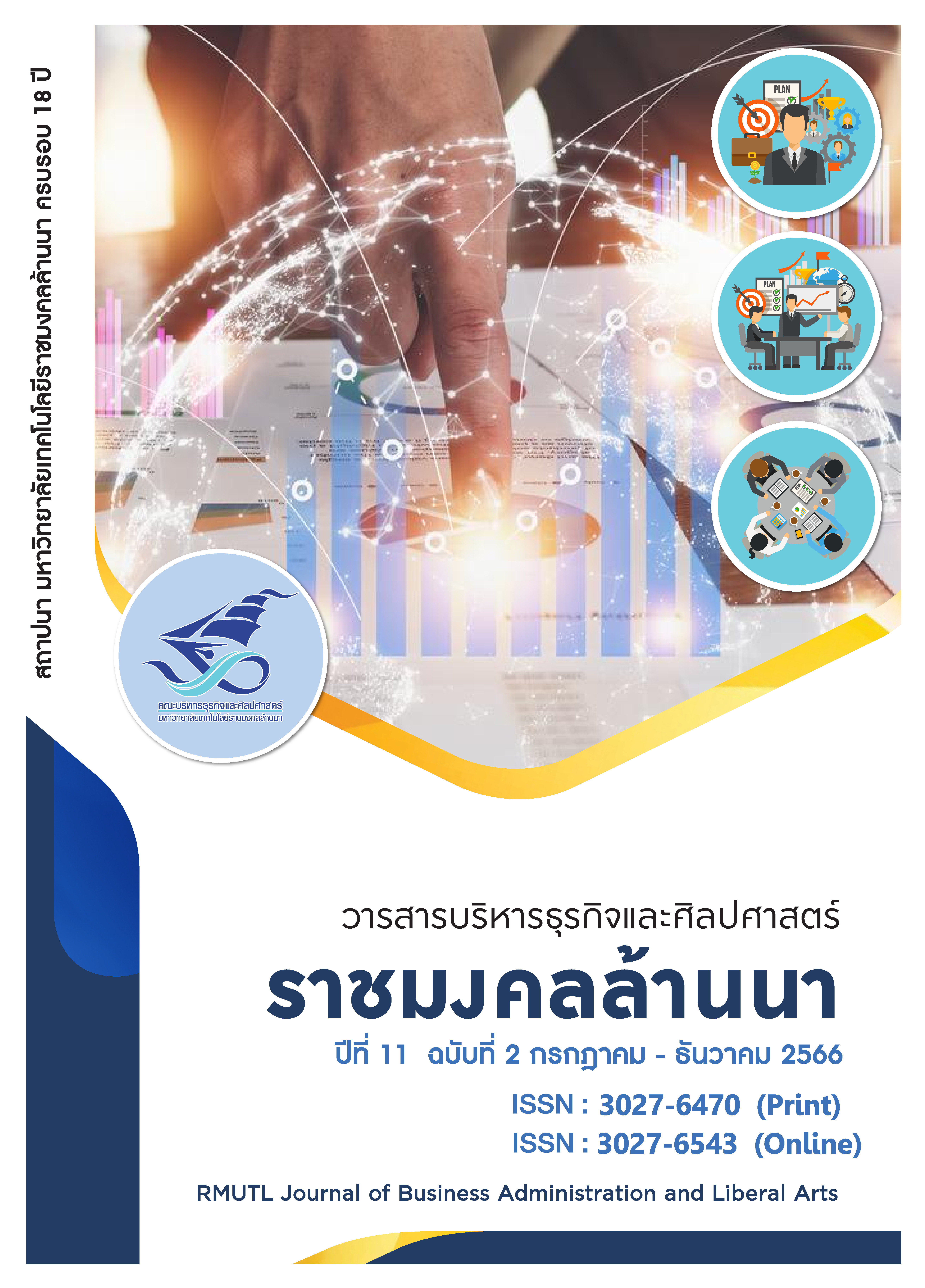ส่วนประสมการตลาดบริการ คุณภาพบริการ และการตลาดเชิงประสบการณ์ ที่ส่งผลต่อความภักดีเชิงเจตคติร้านอาหารของผู้บริโภคเจนเนอเรชันวาย ในเมืองเยียนไถ มณฑลซานตง ประเทศสาธารณรัฐประชาชนจีน
Main Article Content
บทคัดย่อ
การศึกษาครั้งนี้ มีวัตถุประสงค์เพื่อศึกษาระดับความสำคัญของส่วนประสมการตลาดบริการ คุณภาพบริการ การตลาดเชิงประสบการณ์ และความภักดีเชิงเจตคติร้านอาหารของผู้บริโภคเจนเนอเรชันวายในเมืองเยียนไถ มณฑลซานตง ประเทศสาธารณรัฐประชาชนจีน และศึกษาอิทธิพลของส่วนประสมการตลาดบริการ คุณภาพบริการ และการตลาดเชิงประสบการณ์ที่ส่งผลต่อความภักดีเชิงเจตคติของผู้บริโภคเจนเนอเรชันวายในเมืองเยียนไถ มณฑลซานตง ประเทศสาธารณรัฐประชาชนจีน กลุ่มตัวอย่างที่ใช้ในการศึกษา คือ กลุ่มผู้บริโภคชาวจีนเจนเนอเรชันวาย ในเมืองเยียนไถ มณฑลซานตง ประเทศสาธารณรัฐประชาชนจีน จำนวน 385 คน เป็นการวิจัยเชิงสำรวจ เครื่องมือที่ใช้ในการศึกษาเป็นแบบสอบถาม สถิติที่ใช้ในการวิเคราะห์ข้อมูล ประกอบด้วย สถิติพรรณนา ได้แก่ ค่าความถี่ ร้อยละ ค่าเฉลี่ย ส่วนเบี่ยงเบนมาตรฐาน และสถิติอนุมาน ได้แก่ การถดถอยพหุคูณด้วยวิธี Enter
ผลการวิจัยพบว่าผู้บริโภคให้ความสำคัญต่อทุกปัจจัยในระดับมาก เรียงลำดับได้ดังนี้ ด้านคุณภาพบริการมีความสำคัญในระดับมากที่สุด รองลงมาคือด้านการตลาดเชิงประสบการณ์ และด้านส่วนประสมทางการตลาดบริการ ลำดับสุดท้ายคือ ด้านความภักดีเชิงเจตคติ ผลการทดสอบสมมติฐานพบว่าปัจจัยด้านคุณภาพบริการมีผลต่อความภักดีเชิงเจตคติมากที่สุด รองลงมาคือ ส่วนประสมทางการตลาดบริการ โดยมีนัยสำคัญทางสถิติที่ระดับ 0.001 และการตลาดเชิงประสบการณ์มีผลต่อความภักดีเชิงเจตคติ โดยมีนัยสำคัญทางสถิติที่ระดับ 0.05 ผลการวิจัยครั้งนี้ทำให้ผู้ประกอบการธุรกิจต้องคำนึงถึงคุณภาพบริการเป็นสำคัญและกำหนดแนวทางในการพัฒนาปรับปรุงการให้บริการโดยใช้ส่วนประสมทางการตลาดบริการในการตอบสนองความต้องการของผู้บริโภค และการส่งเสริมให้เกิดการตลาดเชิงประสบการณ์เพื่อสร้างความภักดีเชิงเจตคติแก่ผู้บริโภคซึ่งเป็นประโยชน์โดยตรงในการขับเคลื่อนธุรกิจให้ประสบความสำเร็จ
Article Details

อนุญาตภายใต้เงื่อนไข Creative Commons Attribution-NonCommercial-NoDerivatives 4.0 International License.
บทความวิจัยนี้เป็นของลิขสิทธิ์
เอกสารอ้างอิง
เกศณีย์ อยู่เจริญ. (2559). ปัจจัยที่มีอิทธิพลต่อความจงรักภักดีของลูกค้าที่มีต่ออาหารแช่แข็งพร้อมรับประทานในร้านสะดวกซื้อในกรุงเทพมหานคร. (วิทยานิพนธ์ บริหารธุรกิจมหาบัณฑิต). นครปฐม: มหาวิทยาลัยศิลปากร.
ชัยสมพล ชาวประเสริฐ. (2546). การตลาดบริการ. (พิมพ์ครั้งที่ 6). กรุงเทพฯ : ซีเอ็ดยูเคชั่น.
ธนพร มหัธธัญญวาณิชย์, เจษฎา วงศ์แสนสุขเจริญ และสมบูรณ์ สารพัด. (2561). ส่วนประสมการตลาดบริการ และการรับรู้คุณค่าที่ส่งผลต่อความจงรักภักดีของผู้ใช้บริการร้านอาหารเพื่อสุขภาพ จังหวัดชลบุรี. วารสารการบริหารและจัดการ, 8(1), 69-82.
ธนวัฒน์ เขษมวงศ์. (2563). ปัจจัยที่มีความสัมพันธ์ต่อความภักดีของผู้บริโภคในการใช้บริการร้านอาหารญี่ปุ่นในเขตกรุงเทพมหานคร. (สารนิพนธ์ ปริญญาบริหารธุรกิจมหาบัณฑิต). กรุงเทพฯ: สถาบันเทคโนโลยีไทย-ญี่ปุ่น.
นุศรา อินแถลง และธนกร สิริสุคันธา. (2564). คุณภาพบริการและการตัดสินใจซื้อที่มีต่อความภักดีของลูกค้าร้านวัสดุก่อสร้าง ในเขตอำเภองาว จังหวัดลำปาง. วารสารบริหารธุรกิจและศิลปศาสตร์ ราชมงคล ล้านนา, 9(1), 11-18.
ปัทมา ตุงคะเสรีรักษ์ และไพรพันธ์ ธนเลิศโศภิต. (2563) ปัจจัยส่วนประสมทางการตลาดที่มีผลต่อการตัดสินใจซื้อสินค้าในตลาดชุมชนของผู้บริโภคในอำเภอเมืองลำพูน จังหวัดลำพูน. วารสารบริหารธุรกิจและศิลปศาสตร์ ราชมงคลล้านนา, 8(2), 13-31.
วรรณพร ผาสุก, ธนภณ นิธิเชาวกุล และกัญจนวลัย นนทแก้ว แฟร์รี่. (2565). การตลาดเชิงประสบการณ์ที่ส่งผลต่อการกลับมาท่องเที่ยวซ้ำในเขตพื้นที่เมืองพัทยาของกลุ่มนักท่องเที่ยวชาวไทย. วารสารคุณภาพ ชีวิตกับกฎหมาย, 18(1), 82-94.
ศิริวรรณ เสรีรัตน์ และคณะ. (2552). การบริหารการตลาดยุคใหม่. กรุงเทพฯ: ธรรมสาร.
ศิริวรรณ เอี่ยมศิริ, สฤษฎ์ ตะเส และลินดา ชาวนา. (2566). ปัจจัยที่ส่งผลต่อความภักดีต่อตราสินค้าร้านอาหารฟาสต์ฟู้ดของผู้บริโภค ในเขตกรุงเทพมหานคร. (การค้นคว้าอิสระ ปริญญามหาบัญฑิต). กรุงเทพฯ: มหาวิทยาลัยรัตนบัณฑิต.
ศูนย์ข้อมูลเพื่อธุรกิจไทยในจีน ณ เมืองชิงเต่า. (2561). มณฑลซานตง. สืบค้น 28 สิงหาคม 2565. จาก. https://thaibizchina.com/country/shandong.
สุริยน การะเวก. (2564). คุณภาพการบริการ ความภักดีของผู้ใช้บริการ ที่ส่งผลต่อการสื่อสารแบบปากต่อปากในการทําธุรกิจ โต๊ะจีนในจังหวัดสุพรรณบุรี. (วิทยานิพนธ์ บริหารธุรกิจมหาบัณฑิต). กรุงเทพฯ: มหาวิทยาลัยศิลปากร
สำนักงานส่งเสริมการค้าในต่างประเทศ ณ เมืองชิงต่าว. (2565). ส่องปัจจัยที่ผลักดันการยกระดับการบริโภคอาหารหลักยุคใหม่ในตลาดจีน. สืบค้น 28 สิงหาคม 2565. จาก. https://oldweb.ditp.go.th/contents_attach/760658/760658.pdf.
สำนักงานส่งเสริมการค้าในต่างประเทศ ณ เมืองเซี่ยเหมิน. (2565). พฤติกรรมการบริโภคของกลุ่ม Gen Z กับอุตสาหกรรมร้านอาหารในจีน. สืบค้นเมื่อ 28 สิงหาคม 2565. จาก. https://oldweb.ditp.go.th/contents_attach/789809/789809.pdf
Chen Xuezhen, (2020). The Popular "Yantai Flavor" [J]. Going to the World, 2020 : 75-77.
Cochran, W.G. (1977). Wiley: Sampling Techniques. 3rd ed. New York: John Wiley & Sons.
Da Silva, R.V. Alwi, S.F.S. (2008). Online corporate brand image, satisfaction and loyalty. Journal of Brand Management, 16(3), 119-144.
Etzel, M. J., Walker, B. J., & Stanton, W. J. (2007). Marketing (14th ed.). Boston: McGraw-Hill/Irwin.
Funcrowd. (2565). ส่วนประสมทางการตลาด: การตลาดที่ดีเริ่มจากพื้นฐานที่ดี. สืบค้น 28 สิงหาคม 2565. จาก https://fun crowd.co.th.
Jacoby, J., & Chestnut, R. W. (1978). Brand loyalty: measurement and management. New York: John Wiley & Sons.
Kevin, K. L. (2012). Understanding the richness of brand relationships: Research dialogue on brands as intentional agents. Journal of Consumer Psychology, 22(2), 186- 190.
Kotler, P., & Keller, K. L. (2000). Marketing management (12th ed.). New Jersey: Pearson Prentice Hall.
Kotler & Keller. (2016). Marketing management: The millennium (14th ed.) New Jersey: Prentice-Hall Inc.
Lee, F., Lee, C., & Lee, A. (2000). Marketing Research, New York: John Wiley and Son.
Likert, R. (1970). A Technique for the Measurement of Attitude. In G.F. Summer (ED). Attitudes measurement. New York: Rand Mcnally. Brace & World.
Miller, R. K. & Washington, K. (2008). Generational focus. The 2009 Entertainment, media & advertising market research handbook, 157-166.
Nunnally, J. C. (1978). Psychometric Theory (2nd ed.). New York: McGraw-Hill, 245 – 246.
Parasuraman, A., Berry, L. L., & Zeithaml, V.A. (1988). Delivering quality service:
Schmenner, R. W. (1988). Escaping the black holes of cost accounting. Business Horizons, 31(1), 66 - 72.
Solomon, R. M. (2009). Consumer behavior: buying, having and being. (9th ed.). Upper Saddle River, NJ: Pearson Prentice Hall.
Williams, K. D., Cheung, C. K. T., & Choi, W. (2000). Cyberostracism: Effects of being ignored over the Internet. Journal of Personality and Social Psychology, 79(5), 748-762.
Yarrow, K. & O’Donnell, J. (2009). Gen buy: How tweens, teens, and twentysomethings are revolutionizing retail. Market Street, SF: A Wiley Imprint.
Zhang Yumeng, Xiang Mingjia & Zhao Shide. (2022). Cross-border logistics service quality to consumer satisfaction and its Influence and advice on repurchase intent. Journal of 3Zhejiang Shuren University, 22(4), 61-69.

